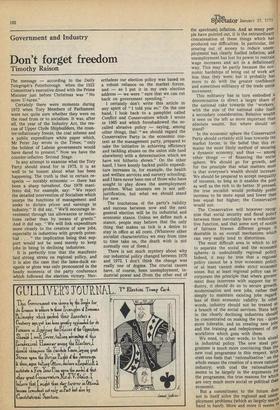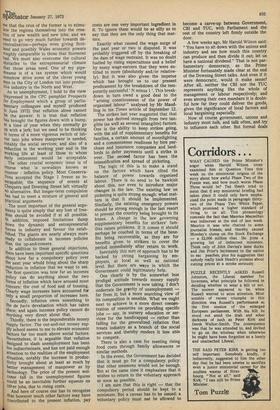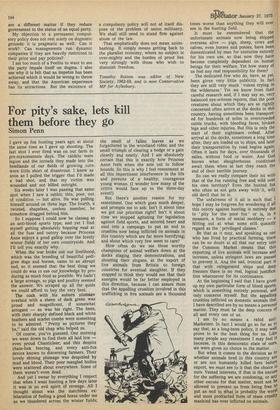Don't forget freedom
Timothy Raison
The message — according to the Daily Telegraph's Peterborough when the 1922 Committee's executive dined with the Prime Minister just before Christmas was "No more U-turns."
Certainly there were moments during 1972 when Tory Members of Parliament were not quite sure whether they were on the road from or to socialism. It was, after all, the year of the Industry Act, the rescue of Upper Clyde Shipbuilders, the counter-inflationary freeze, the coal scheme and a public expenditure white paper which, Mr Peter Jay wrote in the Times, "only the boldest of Labour governments would have dared to present." Now we have the counter-inflation Second Stage. In any attempt to examine what the Tory Party should stand for in 1973, it is as well to be honest about what has been happening. The truth is that in certain respects — notably economic — there has been a sharp turnabout. Our 1970 manifesto did, for example, say: " We reject the detailed intervention of Socialism which usurps the functions of management and seeks to dictate prices and earnings in industry." It did say, "We'll encourage investment through tax allowances or reductions rather than by means of grants." And it did say, "We will link expenditure more closely to the creation of new jobs, especially in industries with growth potential . . . " the implication being that support would not be used merely to keep jobs in being in declining industries. It is perfectly true that the manifesto laid strong stress on regional policy, and it is also the case that the lame-duck exegesis or gloss was only pronounced in the heady moments of the party conference which followed the election victory. Nev ertheless our election policy was based on a robust reliance on the market forces, and — as I put it in my own election address — we were "sure that we can cut back on government spending." I certainly don't write this article in any spirit of "I told you so." On the one hand, I look back to a pamphlet called Conflict and Conservatism which I wrote in 1965 and which foreshadowed the socalled abrasive policy — saying, among other things, that "we should regard the Conservative Party in the economic context as the management party, prepared to take the initiative in achieving efficiency and tackling abuses on the union side (and elsewhere) with a determination which we have not hitherto shown." On the other hand, I have keenly backed public expenditure increases in, for example, the health and welfare services and nursery schooling; and I have never been one of those who have sought to play down the unemployment problem. What interests me is not selfjustification, but what we should stand for now.
The touchstone of the party's validity and success between now and the next general election will be its industrial and economic stance. Unless we define such a stance, people may believe that the only thing that makes us tick is a desire to stay in office at all costs. (Whatever other socialist characteristics we may from time to time take on, the death wish is not normally one of them.) There is not much mystery about why our industrial policy changed between 1970 and 1972. I don't think the change was really one of dogma. The crucial causes have, of course, been unemployment, industrial power and (from the other end of the spectrum) inflation. And as many people have pointed out, it is the extraordinary concatenation of these things which has produced our difficulties. In particular, the pouring out of money to reduce unemployment has clearly fuelled inflation; and unemployment has lost its power to restrain wage increases and act in a deflationary way. This may be partly because the economic hardships of being out of work are less than they were; but it probably has more to do with the greater Confidence and sometimes militancy of the trade union movement.
This militancy has in turn embodied a determination to direct a larger share of the national cake towards the 'workers,' with the size of the national cake itself a secondary consideration. Relative wealth is seen on the left as more important than absolute wealth. But where should we stand? In the economic sphere the Conservative Party should certainly still lean towards the market forces, in the belief that this remains the most likely method of securing a dynamic economy, and thus — among other things — of financing the social sphere. We should go for growth, and for the principle that what matters most is that everyone's wealth should increase. We should be prepared to accept inequality of incomes, so long as it enables the pool' as well as the rich to do better. If pressed. the true socialist would probably prefer incomes to be more equal and lower than less equal but higher; the Conservative would not.
The Conservative will however recognise that social security and fiscal policY between them inevitably have a redistribtl' tive function, and that some sort of notion of fairness btween different groups is desirable in an overall mechanism which can very easily tend to distortions. The most difficult area in which to trY to separate the social and the economic spheres• is undoubtedly regional policY. Indeed, it may be true that a regional policy cannot be a true economic policY, or at least cannot make strict economic sense. But at least regional policy can incorporate the principle that where government does intervene with support for industry, it should do so to secure growth, modernisation and new jobs, rather than simply to maintain existing jobs regard' less of their economic validity. To other words, industry should not be treated aS a branch of the social services. State hell; in the clearly declining industries should be concentrated on making the run down more tolerable, and on creating new jobs and the training and redeployment of the workforce which goes with them. We need, in other words, to look ahead in industrial policy. The new steel programme is much more convincing than the new coal programme in this respect. With steel one feels that ' rationalisation ' on the whole means the creation of a more rational industry; with coal the rationalisation seems to be largely in the arguments 10' the programme, the true reasons for whicb are very much more social or political than economic. But a commitment to the future does not in itself solve the regional and unenI ployment problems (which so largely march hand in hand). More and more it seems t° roe that the crux of the former is to stimulate the regions themselves into the creation of new wealth and new jobs, and we need to go very much further towards decentralisation—perhaps even giving Scotland and possibly Wales economic powers roughly camparable to those that Stormont had. We must also overcome the cultural Obstacles to the entrepreneurial climate that those areas need. One of my pipedreams is of a tax system which would somehow drive some of the clever young 'nen in the City of London out into productive industry in the North and West.
As to unemployment, I hold to the view (expressed in the CPC pamphlet Prospects for Employment which a group of parliamentary colleagues and myself produced in June 1972) that reflation alone cannot he the answer. It is true that reflation has brought the figures down with a bump, at a time of year when they normally go tiP with a jerk; but we need to be thinking Ill terms of a more vigorous switch of labour into jobs where manpower is needed, notably the social services; and also of a reduction in the working year and in the Working life at least of those to whom early retirement would be acceptable.
The other crucial economic issue is of course what is nowadays known as counter inflation policy. Most Conservatives accepted the Stage 1 freeze as inescapable; the sequence of events at Chequers and Downing Street left virtually 00 alternative. But longer-term compulsion has had to meet a mixture of general and Practical arguments.
The most important of the general arguMents is quite simply that any loss of freedom should be avoided if at all possible. 'n addition, imposed limitations damp cloWn the dynamic and entrepreneurial forces in industry and favour the established. The giants are nearly always more ready to collaborate in incomes policies than the up-and-comers.
In addition to these general objections, there have been important specific questions about how far a compulsory policy over the next year would bring about the sharp reduction in inflation that we want to see. The first question was how far an incomes Policy can do anything about the two forms of inflation which have aroused most concern: the cost of food and of housing. Clearly wage increases have accounted for °Ply a small proportion of increases here.
Secondly, inflation owes something to the de facto devaluation which has taken Place; and again incomes policy cannot do anything very direct about that.
Thirdly, there is the imponderable money 1 I supply factor. The out-and-out money supPly school seems to me to elevate economic factors far too much above social factors. Nevertheless, it is arguable that reflation designed to slash unemployment has been too indiscriminate, and has not paid enough attention to the realities of the employment situation, notably the increase in productivity brought about at least as much by better management of manpower as by technology. The price of the present welcome fall in the unemployment figures 1 could be an inevitable further squeeze on other jobs, due to rising costs. And here of course one has to recognise that however much other factors may have contributed to the present inflation, pay costs are one very important ingredient in it. To ignore them would be as silly as to say that they are the only thing that matters.
Exactly what caused the wage surge of the past year or two is disputed. It was probably triggered off by the breaking of the dam of wage restraint. It was no doubt fuelled by rising expectations and a belief by many wage-earners that they were entitled to more (absolutely and/or relatively). But it was also given the impetus which has brought us to our present predicament by the breakdown of the temporarily successful ' N minus 1 '. This breakdown in turn owed a good deal to the "arising consciousness of the power of organised labour" analysed by Mr Maudling in his Times article of September 12.
The strikes last year suggested that that power has derived strength from two tangible (as well as several intangible) factors. One is the ability to keep strikes going, with the aid of supplementary benefits for families, a certain amount of moonlighting and a commonsense readiness by hire purchase and insurance companies and landlords to defer payments until a strike is over. The second factor has been the intensification and spread of picketing.
The logic of this is to make a stand on the factors which have tilted the balance of power towards organised labour. There is no need to be hawkish about this, nor even to introduce major changes in the law. The existing law on picketing is quite strong enough: what matters is that it should be implemented. Similarly, the existing emergency powers should be strong enough in the last resort to prevent the country being brought to its knees. A change in the law governing supplementary benefits for strikers' families raises problems. If it comes it should perhaps be couched in terms of the benefits being recoverable, as they are for benefits given to strikers to cover the period immediately after return to work.
Inevitably this sort of approach has to be backed by strong bargaining by employers, at local as well as national level. But there are ways in which the Government could legitimately help.
One clearly is by the somewhat less prodigal attitude towards money supply that the Government is now taking. I don't underrate the gravity of unemployment — far from it; but a more searching view of its composition is sensible. What we ought next to achieve is a more direct concentration of resources on providing specific jobs — say, in nursery education or services for the handicapped — rather than falling for the generalised reflation that treats industry as a branch of the social services and thereby renders it less able to compete.
There is also a case for meeting rising food costs through family allowances or similar methods.
In the event, the Government has decided that it must go for a compulsory policy: that other measures would not be enough. But at the same time it emphasises that it wishes to return to the voluntary approach as soon as possible.
I am sure that this is right — that the compulsory period should be kept to a minimum. But a caveat has to be issued: a voluntary policy must not be allowed to become a carve-up between Government, CBI and TUC, with Parliament and the rest of the country left firmly outside the door.
A few weeks ago, Mr Harold Wilson said: "You have to sit down with the unions and industry and see how much this country can produce and then divide it out; let us have a national dividend." That is not parliamentary democracy, as the Prime Minister fortunately made clear at the end of the Downing Street talks. And even if it were democratic, would it make sense? After all, neither the CBI nor the TUC represents anything like the whole of management or labour respectively; and even among their own members it is doubtful how far they could deliver the goods, given the significance of local factors and local bargaining especially.
Now of course government, unions and industry must talk, and talk often, and try to influence each other. But formal deals are a different matter if they reduce government to the status of an equal party.
My objection to a permanent compulsory policy does not rest solely on dogmatic grounds: it is pragmatic as well. Can it work? Can managements run dynamic companies if they are heavily restricted in their price and pay policies?
I am too much of a Peelite to want to see the party impale itself on dogma. I also see why it is felt that an impetus has been achieved which it would be wrong to throw away, and that the American experience has its attractions. But the existence of a compulsory policy will not of itself dispose of the problem of union militancy. We shall still need to stand firm against abuse of the law.
That emphatically does not mean unionbashing. It simply means getting back to the pluralist economy, where no subject is over-mighty and the burden of proof lies very strongly with those who wish to diminish freedom.
Timothy Raison was editor of New Society, 1962-68, and is now Conservative MP for Aylesbury.




































 Previous page
Previous page